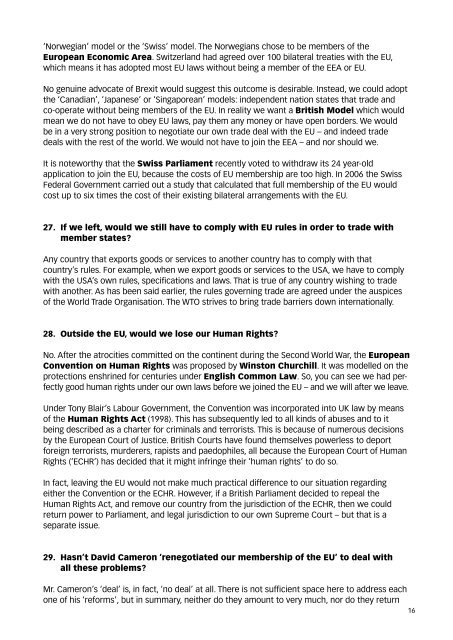EU Referendum FAQ v4
For those undecided in which way to vote in the EU referendum,this addresses the main questions and concerns people have
For those undecided in which way to vote in the EU referendum,this addresses the main questions and concerns people have
You also want an ePaper? Increase the reach of your titles
YUMPU automatically turns print PDFs into web optimized ePapers that Google loves.
‘Norwegian’ model or the ‘Swiss’ model. The Norwegians chose to be members of the<br />
European Economic Area. Switzerland had agreed over 100 bilateral treaties with the <strong>EU</strong>,<br />
which means it has adopted most <strong>EU</strong> laws without being a member of the EEA or <strong>EU</strong>.<br />
No genuine advocate of Brexit would suggest this outcome is desirable. Instead, we could adopt<br />
the ‘Canadian’, ‘Japanese’ or ‘Singaporean’ models: independent nation states that trade and<br />
co-operate without being members of the <strong>EU</strong>. In reality we want a British Model which would<br />
mean we do not have to obey <strong>EU</strong> laws, pay them any money or have open borders. We would<br />
be in a very strong position to negotiate our own trade deal with the <strong>EU</strong> – and indeed trade<br />
deals with the rest of the world. We would not have to join the EEA – and nor should we.<br />
It is noteworthy that the Swiss Parliament recently voted to withdraw its 24 year-old<br />
application to join the <strong>EU</strong>, because the costs of <strong>EU</strong> membership are too high. In 2006 the Swiss<br />
Federal Government carried out a study that calculated that full membership of the <strong>EU</strong> would<br />
cost up to six times the cost of their existing bilateral arrangements with the <strong>EU</strong>.<br />
27. If we left, would we still have to comply with <strong>EU</strong> rules in order to trade with<br />
member states?<br />
Any country that exports goods or services to another country has to comply with that<br />
country’s rules. For example, when we export goods or services to the USA, we have to comply<br />
with the USA’s own rules, specifications and laws. That is true of any country wishing to trade<br />
with another. As has been said earlier, the rules governing trade are agreed under the auspices<br />
of the World Trade Organisation. The WTO strives to bring trade barriers down internationally.<br />
28. Outside the <strong>EU</strong>, would we lose our Human Rights?<br />
No. After the atrocities committed on the continent during the Second World War, the European<br />
Convention on Human Rights was proposed by Winston Churchill. It was modelled on the<br />
protections enshrined for centuries under English Common Law. So, you can see we had perfectly<br />
good human rights under our own laws before we joined the <strong>EU</strong> – and we will after we leave.<br />
Under Tony Blair’s Labour Government, the Convention was incorporated into UK law by means<br />
of the Human Rights Act (1998). This has subsequently led to all kinds of abuses and to it<br />
being described as a charter for criminals and terrorists. This is because of numerous decisions<br />
by the European Court of Justice. British Courts have found themselves powerless to deport<br />
foreign terrorists, murderers, rapists and paedophiles, all because the European Court of Human<br />
Rights (‘ECHR’) has decided that it might infringe their ‘human rights’ to do so.<br />
In fact, leaving the <strong>EU</strong> would not make much practical difference to our situation regarding<br />
either the Convention or the ECHR. However, if a British Parliament decided to repeal the<br />
Human Rights Act, and remove our country from the jurisdiction of the ECHR, then we could<br />
return power to Parliament, and legal jurisdiction to our own Supreme Court – but that is a<br />
separate issue.<br />
29. Hasn’t David Cameron ‘renegotiated our membership of the <strong>EU</strong>’ to deal with<br />
all these problems?<br />
Mr. Cameron’s ‘deal’ is, in fact, ‘no deal’ at all. There is not sufficient space here to address each<br />
one of his ‘reforms’, but in summary, neither do they amount to very much, nor do they return<br />
16







